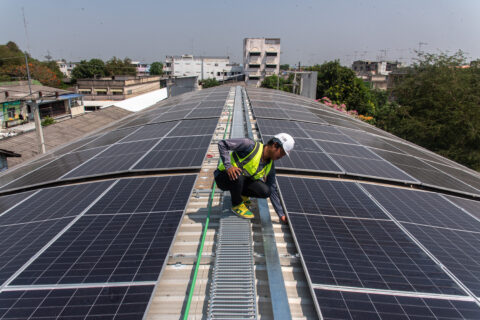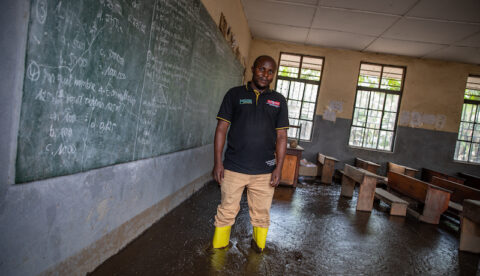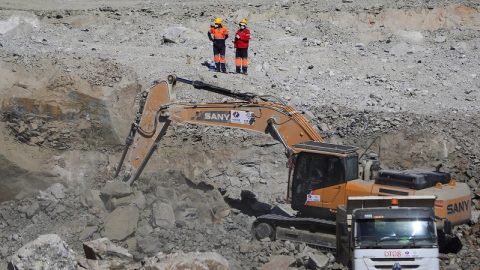Climate-vulnerable island states say they are being trapped “between a rock and a hard place” by the European Union – led by the Netherlands and Denmark – after the bloc engaged in discussions on a proposal to clean up the global shipping industry that islands regard as ineffective and unjust.
On the sidelines of Singapore Maritime Week on Wednesday, representatives of the European Commission, Denmark and the Netherlands met with officials from China, Japan and Singapore. According to official notes from the meeting, seen by Climate Home, they talked about an emissions trading proposal known as “J9”, which was put on the table by Singapore at the International Maritime Organization (IMO) in February during negotiations on a new pioneering system to tax pollution.
The J9 idea is an alternative to taxing all of a ship’s emissions as favoured initially by small island states and now supported by shipping-reliant nations like Panama and Liberia as well as the UK, Nigeria, Kenya and others. Some big emerging economies like Brazil and China have opposed a full levy, as they fear it will drive up shipping costs and put them at a disadvantage.
It’s time for shipping to launch first global tax on a polluting sector
Analysis by University College London says the J9 proposal will raise much less money for climate action and will promote short-term solutions like gas and biofuels, rather than zero-emission fuels based on green hydrogen.
Preparing to compromise
A full levy on a ship’s emissions remains the European Union’s preferred option – but IMO watchers say the bloc’s willingness to discuss details of the alternative proposal suggests it is preparing to accept it at crunch talks taking place over the next two weeks in London.
A Pacific negotiator familiar with the talks told Climate Home that the EU “have signalled quite confidently that they will take a compromise that will cede grounds to a levy”. “Once again, Europeans have locked the islands and many in the developing world between a rock and a hard place,” they added.
But a spokesperson for the Danish Maritime Authority said that Denmark and the EU still “clearly prefer a global greenhouse gas levy as part of the regulation”.
The talks in Singapore “were part of an informal dialogue with all IMO member states, including Pacific Island countries”, they noted, adding “the purpose was to explore the possibilities of reaching consensus at the IMO in case that neither the levy nor the Chinese-Brazilian proposed fuel standard would be acceptable in the final negotiations.”
“Catastrophic” acid spills at copper mines test Zambia’s plans to boost production
The Pacific negotiator said the J9 proposal “will not deliver” the emissions reductions governments agreed to aim for two years ago, including to reach net zero in the industry “close to 2050”.
The J9 proposal will raise some money for climate action by allowing shipowners who pollute more than they should to make up for it by buying “remedial units”, paying into the IMO’s net zero fund. But they will also be able to cancel out their excess emissions by buying credits from ships that have polluted below their limit – with the money going to the shipowners.
Not enough money raised
UCL researchers predict this system would raise just 5-25% of even a weak version of the carbon levy system the Pacific islands and others want. A full levy could raise tens of billions of dollars a year to invest in climate action and address the negative impacts of the green fuel measures on less-developed economies.
The head of an African environmental think-tank, who wanted to remain anonymous, told Climate Home that the J9 proposal “is not a desirable alternative for developing countries in Africa and would not provide the needed answer to raise climate finance”. On the other hand, Kenya’s climate envoy Ali Mohamed wrote in a recent article that the levy proposal would channel “vital funds” and be a “a precedent-setting move”.
The UCL analysis found that J9 would encourage investment in biofuels and fossil gas to power ships, leaving “no to little resources” to reward early adopters of zero-emission fuels based on green hydrogen like methanol and ammonia.
Carbon credit auditors suspended for failures in sham rice-farming offsets
The authors say this is because the J9 proposal would not provide certainty and clarity on the competitiveness of different clean fuel options, creating an incentive for shipowners to pursue short-term lower-emitting solutions rather than long-term fixes like zero emission fuels.
Last week’s talks at Singapore Maritime Week were informal. Official talks will begin at the IMO’s London headquarters on Monday. After a week behind closed doors, discussions will be opened up to the media for a week on April 7. By the end of that week, negotiators hope to have reached agreement on green measures that can be signed off at the IMO’s next environmental meeting in October.
The Pacific negotiator said small island nations are appealing for EU member states that are “far more progressive” than the Netherlands and Denmark to intervene. The Dutch ministry of infrastructure and water did not immediately respond to requests for comment.
The post Small islands fear EU betrayal over shipping emissions levy appeared first on Climate Home News.
Climate Change
Colombia proposes expert group to advance talks on minerals agreement
Colombia wants countries to discuss options for a global agreement to ensure that the extraction, processing and recycling of minerals – including those needed for the clean energy transition – don’t harm the environment and human wellbeing.
The mineral-rich nation is proposing to create an expert group to “identify options for international instruments, including global and legally-binding instruments, for coordinated global action on the environmentally sound management of minerals and metals through [their] full lifecyle”.
Colombia hopes this will eventually lead to an agreement on the need for an international treaty to define mandatory rules and standards that would make mineral value chains more transparent and accountable.
The proposal was set out in a draft resolution submitted to the UN Environment Assembly (UNEA) earlier this week and seen by Climate Home News. UNEA, which is constituted of all UN member states, is the world’s top decision-making body for matters relating to the environment. The assembly’s seventh session will meet in Kenya in December to vote on countries’ proposals.
Soaring demand for the minerals used to manufacture clean energy technologies and electric vehicles, as well as in the digital, construction and defence industries have led to growing environmental destruction, human rights violations and social conflict.
Colombia argues there is an “urgent need” to strengthen global cooperation and governance to reduce the risks to people and the planet.
Options for a global minerals agreement
The proposal is among a flurry of initiatives to strength global mineral governance at a time when booming demand is putting pressure on new mining projects.
Colombia, which produces emeralds, gold, platinum and silver for exports, first proposed the idea for a binding international agreement on minerals traceability and accountability on the sidelines of the UN biodiversity talks it hosted in October 2024.
Since then, the South American nation has been quietly trying to drum up support for the idea, especially among African and European nations.
Its draft resolution to UNEA7 contains very few details, leaving it open for countries to discuss what kind of global instrument would be best suited to make mineral supply chains more transparent and sustainable.
Does the world need a global treaty on energy transition minerals?
Colombia says it wants the expert group to build on other UN initiatives, including a UN Panel on Critical Energy Transition Minerals, which set out seven principles to ensure the mining, processing and recycling of energy transition minerals are done responsibly and benefit everyone.
The group would include technical experts and representatives from international and regional conventions, major country groupings as well as relevant stakeholders.
It would examine the feasibility and effectiveness of different options for a global agreement, consider their costs and identify measures to support countries to implement what is agreed.
The resolution also calls for one or two meetings for member states to discuss the idea before the UNEA8 session planned in late 2027, when countries would decide on a way forward.
No time to lose for treaty negotiations
Colombia’s efforts to advance global talks on mineral supply chains have been welcomed by resource experts and campaigners. But not everyone agrees on the best strategy to move the discussion forward at a time when multilateralism is coming under attack.
Johanna Sydow, a resource policy expert who heads the international environmental policy division of the Heinrich-Böll Foundation, said she had hoped that the resolution would explicitly call for negotiations to begin on an international minerals treaty.
“Treaty negotiations take a long time. If you don’t even start with it now, it will take even longer. I don’t see how in two or three years it will be easier to come to an agreement,” she told Climate Home.
Despite the geopolitical challenges, “we need joint rules to prevent a huge race to the bottom for [mineral] standards”. That could start with a group of countries coming together and starting to enforce joint standards for mining, processing and recycling minerals, she said.
But any meaningful global agreement on mineral supply chains would require backing from China, the world’s largest processor of minerals, which dominates most of the supply chains. And with Colombia heading for an election in May, it will need all the support it can get to move its proposal forward.
‘Voluntary initiative won’t cut it’
Juliana Peña Niño, Colombia country manager at the Natural Resource Governance Institute, is more optimistic. “Colombia’s leadership towards fairer mineral value chains is a welcome step,” she told Climate Home News.
“At UNEA7, we need an ambitious debate that gives the proposed expert group a clear mandate to advance concrete next steps — not delay decisions — and that puts the voices of those most affected at the centre. One thing is clear: the path forward must ultimately deliver a binding instrument, as yet another voluntary initiative simply won’t cut it,” she said.
More than 50 civil society groups spanning Latin America, Africa and Europe previously described Colombia’s work on the issue as “a chance to build a new global paradigm rooted in environmental integrity, human rights, Indigenous Peoples’ rights, justice and equity”.
“As the energy transition and digitalisation drive demand for minerals, we cannot afford to repeat old extractive models built on asymmetry – we must redefine them,” they wrote in a statement.
Main image: The UN Environment Assembly is hosted in Nairobi, Kenya. (Natalia Mroz/ UN Environment)
The post Colombia proposes expert group to advance talks on minerals agreement appeared first on Climate Home News.
Colombia proposes expert group to advance talks on minerals agreement
Climate Change
California Sanctions Stark Disparities in Pesticide Exposure During Pregnancy
If you’re young, pregnant and Latina, chances are you live near agricultural fields sprayed with higher levels of brain-damaging organophosphate pesticides.
A baby in the womb has few defenses against industrial petrochemicals designed to kill.
California Sanctions Stark Disparities in Pesticide Exposure During Pregnancy
Climate Change
DeBriefed 3 October 2025: UK political gap on climate widens; Fossil-fuelled Typhoon Ragasa; ‘Overshoot’ unknowns
Welcome to Carbon Brief’s DeBriefed.
An essential guide to the week’s key developments relating to climate change.
This week
Shattered climate consensus
FRACKING BAN: UK energy secretary Ed Miliband has announced that the government will bring forward its plans to permanently ban fracking, in a move designed to counter a promise from the hard-right Reform party to restart efforts to introduce the practice, the Guardian said. In the same speech, Miliband said Reform’s plans to scrap clean-energy projects would “betray” young people and future generations, the Press Association reported.
ACT AXE?: Meanwhile, Kemi Badenoch, leader of the Conservatives, pledged to scrap the 2008 Climate Change Act if elected, Bloomberg reported. It noted that the legislation was passed with cross-party support and strengthened by the Conservatives.
‘INSANE’: Badenoch faced a backlash from senior Tory figures, including ex-prime minister Theresa May, who called her pledge a “catastrophic mistake”, said the Financial Times. The newspaper added that the Conservatives were “trailing third in opinion polls”. A wide range of climate scientists also condemned the idea, describing it as “insane”, an “insult” and a “serious regression”.
Around the world
- CLIMATE CRACKDOWN: The US Department of Energy has told employees in the Office of Energy Efficiency and Renewable Energy to avoid using the term “climate change”, according to the Guardian.
- FOREST DELAY: Plans for Brazil’s COP30 flagship initiative, the tropical forests forever fund, are “suffer[ing] delays” as officials remain split on key details, Bloomberg said.
- COP MAY BE ‘SPLIT’: Australia could “split” the hosting of the COP31 climate summit in 2026 under a potential compromise with Turkey, reported the Guardian.
- DIVINE INTERVENTION: Pope Leo XIV has criticised those who minimise the “increasingly evident” impact of global warming in his first major climate speech, BBC News reported.
€44.5 billion
The cost of extreme weather and climate change in the EU in the last four years – two-and-a-half times higher than in the decade to 2019, according to a European Environment Agency report covered by the Financial Times.
Latest climate research
- Fossil-fuelled climate change caused around 36% of Typhoon Ragasa’s direct damage to homes and properties in southern China, according to a rapid impact attribution study | Imperial Grantham Institute – Climate Change and the Environment
- Some 86% of the global population are concerned about climate change, according to a survey of 280,000 people in 142 countries and regions | Climate Policy
- A global shift towards a “planetary health diet” could slash emissions and save tens of thousands of lives each day | EAT-Lancet Commission 2025 report
(For more, see Carbon Brief’s in-depth daily summaries of the top climate news stories on Monday, Tuesday, Wednesday, Thursday and Friday.)
Captured

Clean energy has met 100% of Great Britain’s electricity demand for a record 87 hours this year so far, according to new Carbon Brief analysis. This is up from just 2.5 hours in 2021 and 64.5 hours in all of 2024. The longest stretch of time where 100% of electricity demand was met by clean energy stands at 15 hours, from midnight on 25 May 2025 through to 3pm on 26 May, according to the analysis.
Spotlight
‘Overshoot’ unknowns
As the chances of limiting global warming to 1.5C dwindle, there is increasing focus on the prospects for “overshooting” the Paris Agreement target and then bringing temperatures back down by removing CO2 from the atmosphere.
At the first-ever Overshoot Conference in Laxenburg, Austria, Carbon Brief asks experts about the key unknowns around warming “overshoot”.
Sir Prof Jim Skea
Chair of the Intergovernmental Panel on Climate Change (IPCC) and emeritus professor at Imperial College London’s Centre for Environmental Policy
So there are huge knowledge gaps around overshoot and carbon dioxide removal (CDR). As it’s very clear from the themes of this conference, we don’t altogether understand how the Earth would react in taking CO2 out of the atmosphere.
We don’t understand the nature of the irreversibilities and we don’t understand the effectiveness of CDR techniques, which might themselves be influenced by the level of global warming, plus all the equity and sustainability issues surrounding using CDR techniques.
Prof Kristie Ebi
Professor at the University of Washington’s Center for Health and the Global Environment
There are all kinds of questions about adaptation and how to approach effective adaptation. At the moment, adaptation is primarily assuming a continual increase in global mean surface temperature. If there is going to be a peak – and of course, we don’t know what that peak is – then how do you start planning? Do you change your planning?
There are places, for instance when thinking about hard infrastructure, [where overshoot] may result in a change in your plan – because as you come down the backside, maybe the need would be less. For example, when building a bridge taller. And when implementing early warning systems, how do you take into account that there will be a peak and ultimately a decline? There is almost no work in that. I would say that’s one of the critical unknowns.
Dr James Fletcher
Former minister for public service, sustainable development, energy, science and technology for Saint Lucia and negotiator at COP21 in Paris.
The key unknown is where we’re going to land. At what point will we peak [temperatures] before we start going down and how long will we stay in that overshoot period? That is a scary thing. Yes, there will be overshoot, but at what point will that overshoot peak? Are we peaking at 1.6C, 1.7C, 2.1C?
All of these are scary scenarios for small island developing states – anything above 1.5C is scary. Every fraction of a degree matters to us. Where we peak is very important and how long we stay in this overshoot period is equally important. That’s when you start getting into very serious, irreversible impacts and tipping points.
Prof Oliver Geden
Senior fellow and head of the climate policy and politics research cluster at the German Institute for International and Security Affairs and vice-chair of IPCC Working Group III
[A key unknown] is whether countries are really willing to commit to net-negative trajectories. We are assuming, in science, global pathways going net-negative, with hardly any country saying they want to go there. So maybe it is just an academic thought experiment. So we don’t know yet if [overshoot] is even relevant. It is relevant in the sense that if we do, [the] 1.5C [target] stays on the table. But I think the next phase needs to be that countries – or the UNFCCC as a whole – needs to decide what they want to do.
Prof Lavanya Rajamani
Professor of international environmental law at the University of Oxford
I think there are several scientific unknowns, but I would like to focus on the governance unknowns with respect to overshoot. To me, a key governance unknown is the extent to which our current legal and regulatory architecture – across levels of governance, so domestic, regional and international – will actually be responsive to the needs of an overshoot world and the consequences of actually not having regulatory and governance architectures in place to address overshoot.
Watch, read, listen
FUTURE GAZING: The Financial Times examined a “future where China wins the green race”.
‘JUNK CREDITS’: Climate Home News reported on a “forest carbon megaproject” in Zimbabwe that has allegedly “generated millions of junk credits”.
‘SINK OR SWIM’: An extract from a new book on how the world needs to adapt to climate change, by Dr Susannah Fisher, featured in Backchannel.
Coming up
- 7 October: International Energy Agency (IEA) renewables 2025 report launch
- 8-10 October: World summit of Indigenous peoples and nature, Abu Dhabi, UAE
- 9-15 October: International Union for the Conservation of Nature (IUCN) 2025 congress, Abu Dhabi, UAE
Pick of the jobs
- UK government foreign, commonwealth and development office, senior climate policy adviser | Salary: CA$93,207. Location: Calgary, Canada
- Wellcome Trust, senior research manager, climate and health | Salary: £64,800. Location: London
- Bloomberg, product manager – climate, nature and sustainability regulations | Salary: Unknown. Location: London
DeBriefed is edited by Daisy Dunne. Please send any tips or feedback to debriefed@carbonbrief.org.
This is an online version of Carbon Brief’s weekly DeBriefed email newsletter. Subscribe for free here.
The post DeBriefed 3 October 2025: UK political gap on climate widens; Fossil-fuelled Typhoon Ragasa; ‘Overshoot’ unknowns appeared first on Carbon Brief.
-
Climate Change2 years ago
Spanish-language misinformation on renewable energy spreads online, report shows
-
Climate Change Videos2 years ago
The toxic gas flares fuelling Nigeria’s climate change – BBC News
-
Climate Change2 months ago
Guest post: Why China is still building new coal – and when it might stop
-

 Greenhouse Gases1 year ago
Greenhouse Gases1 year ago嘉宾来稿:满足中国增长的用电需求 光伏加储能“比新建煤电更实惠”
-

 Climate Change1 year ago
Climate Change1 year ago嘉宾来稿:满足中国增长的用电需求 光伏加储能“比新建煤电更实惠”
-
Greenhouse Gases2 months ago
Guest post: Why China is still building new coal – and when it might stop
-

 Carbon Footprint1 year ago
Carbon Footprint1 year agoUS SEC’s Climate Disclosure Rules Spur Renewed Interest in Carbon Credits
-
Renewable Energy3 months ago
US Grid Strain, Possible Allete Sale











